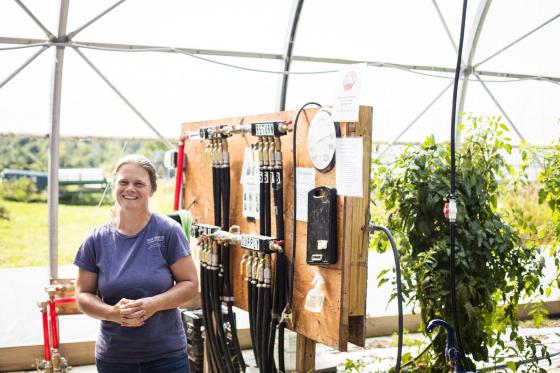Posted March 17, 2022 at 10:36am by Anonymous (not verified)
Jericho Settlers Farm grows year-round

Written by JJ Vandette
Fifteen years ago, Christa Alexander and Mark Fasching started selling the extra produce from their prolific vegetable garden. They invested in some chickens, then some livestock, some more land, and before they knew it they were farming full-time. Fast forward to today. Jericho Settlers Farm is a thriving diversified, organic farm with a large number of wholesale clients as well as CSA, farmer’s market offerings, and a farm stand.
And now, by pairing onsite solar power and biomass heating with energy efficiency, the farm has managed to extend their growing season pretty much year-round.
“We wanted to commit to year-round production, but knew it would increase our energy demand,” says Christa. “The great thing about working with Efficiency Vermont is that all the knowledge is there. You don’t have to figure it out from scratch—all you have to do is ask.”
Between hands-on energy consultation and some helpful cost-sharing agreements with Efficiency Vermont, UVM Extension’s Agricultural Engineering program, and local contractors, she and Mark have managed to grow their business while keeping true to their values and managing overhead.
Noteworthy projects at Jericho Settlers Farm include:
Harnessing the sun for energy and brighter work conditions
A large solar array provides all the electricity the farm needs, powering everything from their vegetable coolers to the forklift they use in cold-storage. Large, East-facing windows in the production barn provide natural light for the workers, which—beyond being a cost-saving measure—help keep morale up through the long winter months.
Energy-efficient produce coolers
Unlike the dry, packaged goods found in most convenience stores, fruits and vegetables require precise temperature and humidity levels. Using advanced refrigeration technologies including evaporator fan controls, efficient motors, and some simple strip curtains over cooler entrances allows the farm to use far less energy than with a conventional set-up.
Curing crops with recycled heat
The farm uses a heat recovery unit to capture waste heat released from their produce cooler’s refrigeration system, then directs that excess heat into a storage area used for onions, squash, and garlic. The heat is used to cure—or slowly dry—these crops so they will keep well through the winter.
Year-round greenhouse to improve cash flow and employee retention
By using a wood pellet boiler and some strategic crop management, Mark and Christa keep fresh greens growing nearly year-round. This allows them to sell produce when it is most in-demand, by growing greens in the fall and early winter and then getting tomatoes to market in early spring—without relying too much on propane.
Keeping production going year-round has helped the farm stay profitable through inevitable difficulties like spring flooding. It has also allowed them to nurture their workforce. “Because we offer more steady employment, we attract great employees. And when people stay on year after year, they’re building up their knowledge base, so it just adds even more value back to the farm.”
Jericho Settlers Farm is saving 30,000 kWh, 158 MMBtu, and more than $8,000 per year thanks to these improvements.
Efficiency Vermont partners on this project included Dick Soule Refrigeration, UVM Extension Agricultural Engineering, Boivin Farm Supply, Paul Mueller Company, Kirby Electric, and FW Webb.
This work is exemplary of the Vermont Farm to Plate food system plan goal to minimize the use of fossil fuels and maximize the renewable energy, energy efficiency, and conservation opportunities at food system businesses. Through the adoption of renewable energy sources, innovative technologies, and energy efficiency improvements, Vermont farmers are able to reduce their operational costs, their energy use, and their environmental impact while creating a more sustainable business.
Learn more at www.efficiencyvermont.com.
